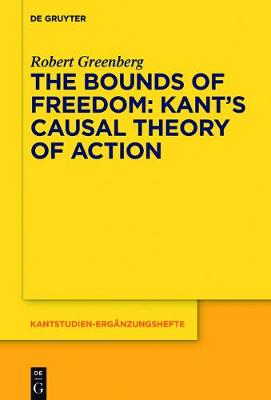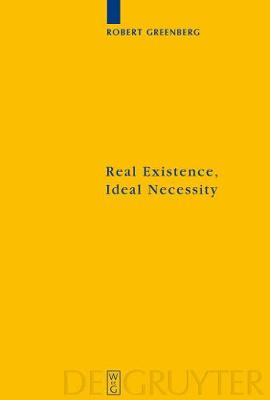Kantstudien-Erganzungshefte
2 total works
The Bounds of Freedom: Kant's Causal Theory of Action
by Robert Greenberg
Published 26 September 2016
This monograph is a new interpretation of Kant's atemporal conception of the causality of the freedom of the will. The interpretation is based on an analysis of Kant's primary conception of an action, viz., as a causal consequence of the will. The analysis in turn is based on H. P. Grice's causal theory of perception and on P. F. Strawson's modification of the theory.
The monograph rejects the customary assumption that Kant's maxim of an action is a causal determination of the action. It assumes instead that the maxim is definitive of the action, and since its main thesis is that an action for Kant is to be primarily understood as an effect of the will, it concludes that the maxim of an action can only be its logical determination.
Kant's atemporal conception of the causality of free will is confronted not only by contemporary philosophical conceptions of causality, but by Kant's own complementary theory of causality, in the Second Analogy of Experience. According to this latter conception, causality is a natural relation among physical and psychological objects, and is therefore a temporal relation among them. Faced with this conflict, Kant scholars like Allen W. Wood either reject Kant's atemporal conception of causality or like Henry E. Allison accept it, but only in an anodyne form. Both camps, however, make the aforementioned assumption that Kant's maxim of an action is a causal determination of the action. The monograph, rejecting the assumption, belongs to neither camp.
The monograph rejects the customary assumption that Kant's maxim of an action is a causal determination of the action. It assumes instead that the maxim is definitive of the action, and since its main thesis is that an action for Kant is to be primarily understood as an effect of the will, it concludes that the maxim of an action can only be its logical determination.
Kant's atemporal conception of the causality of free will is confronted not only by contemporary philosophical conceptions of causality, but by Kant's own complementary theory of causality, in the Second Analogy of Experience. According to this latter conception, causality is a natural relation among physical and psychological objects, and is therefore a temporal relation among them. Faced with this conflict, Kant scholars like Allen W. Wood either reject Kant's atemporal conception of causality or like Henry E. Allison accept it, but only in an anodyne form. Both camps, however, make the aforementioned assumption that Kant's maxim of an action is a causal determination of the action. The monograph, rejecting the assumption, belongs to neither camp.
Analytic philosophy has leveled many challenges to Kant’s ascription of necessary properties and relations to objects in his Critique of Pure Reason. Some of these challenges can be answered, it is argued here, largely in terms of techniques belonging to analytic philosophy itself, in particular, to its philosophy of language. This Kantian response is the primary objective of this book. It takes the form of a compromise between the real existence of the objects that we can intuit and that get our knowledge started – dubbed initiators – and the ideality of the necessary properties and relations that Kant ascribes to our sensible representations of initiators, which he entitles appearances. Whereas the real existence of initiators is independent of us and our senses, the necessity of these properties and relations of appearances is due to their origins in the mind.
The Kantian compromise between real existence and ideal necessity is formulated in terms of David Kaplan’s interpretation of de re necessity in his article, “Quantifying In” – his response to Quine’s concern that a commitment to such a necessity leads to an acceptance of an unwanted traditional Aristotelian essentialism.
In addition, the book first abstracts and then departs from its interpretation of Kant to provide a realistic account of the relation between existence and de re necessity.
The Kantian compromise between real existence and ideal necessity is formulated in terms of David Kaplan’s interpretation of de re necessity in his article, “Quantifying In” – his response to Quine’s concern that a commitment to such a necessity leads to an acceptance of an unwanted traditional Aristotelian essentialism.
In addition, the book first abstracts and then departs from its interpretation of Kant to provide a realistic account of the relation between existence and de re necessity.

